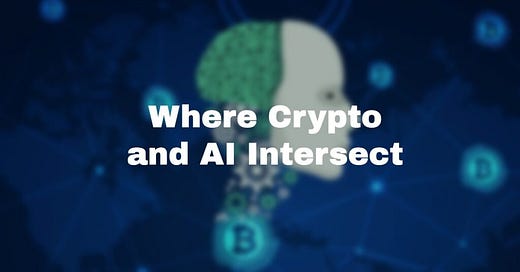Where Crypto and AI Intersect
The combination of crypto and AI can be applied to many use cases to increase transparency and efficiency.
Many "key opinion leaders" left crypto to hop on the AI bandwagon.
But the real gigabrains are figuring out where crypto and AI can work together.
I recently listened to the an episode of the Unchained Podcast with Ilya Polosukhin, Co-Founder of NEAR Protocol, and Jason Warner of Poolside AI where they talked about how Crypto and AI can intersect.
Here’s a rundown of what they discussed on the episode.
The Guests' Backgrounds
Ilya is the founder of NEAR, a Layer-1 blockchain protocol. He worked on machine learning for many years, including a stint at Google Research building TensorFlow and many AI models that now power ChatGPT, Midjourney, and many other popular AI tools.
He then launched an AI startup that tried to crowdsource students around the world to build a better dataset. Paying these students across borders was difficult, so Ilya founded NEAR Protocol to facilitate easier global payments.
Jason Warner was the former CTO of GitHub and had engineering leadership roles at Heroku, Canonical (makers of Ubuntu), and more. While at GitHub, he incubated GitHub Co-Pilot, the AI-driven coding assistant. Now he's building Poolside, essentially OpenAI for software development.
Definition of AI
Right now, AI is most associated with the chat interfaces of ChatGPT and other similar tools based on large language models (LLMs).
But machine learning (ML) and AI are everywhere - from your Google search results to credit scores to product suggestions - and have been for decades. Whatever “feels magical” on a computer is likely done by machine learning.
Jason had a great quote about the definition of AI:
“If it works right now, it's Machine Learning. If you're raising money, it's AI.“ ????
Intersection of AI and Crypto
Here are some examples of possible products where crypto and AI meet:
Generic marketplaces of resources
Blockchain allows anyone to provide and access resources - such as data, compute, and model architectures - needed to build AI products.
Let’s say you need to access GPUs to run ML models. Right now you need to pay some cloud service like AWS, Google Cloud, or Azure a ton of money.
Blockchain allows spot GPU marketplaces to be created, where AI devs could crowdsource these resources so they are cheaper to acquire, and providers of these resources can make money from what would otherwise be idle computing power.
Raven Protocol is a decentralized AI compute protocol that's doing exactly this. Raven is actually founded by my colleague at Deep Ventures, Sherman Lee.
Ocean Protocol is a decentralized marketplace for datasets that can be used to train AI models.
And there are many more!
Provenance and transparency of data
Generative AI tools like ChatGPT and Midjourney take billions of inputs to create their text and image outputs. We have no idea where all of this data comes from, and as such, we don’t know who to attribute these inputs to (they should be recognized!) and if there are copyright issues.
Having these inputs on the blockchain can help identify their sources, pay them for their work, and better understand where all of this data is coming from.
This type of attribution and provenance of data can extend to many forms:
Deepfake identification - blockchain provides tools to identify sources of content as legitimate. For instance, Ilya, Jason and Laura can cryptographically verify on blockchain that they created their podcast episode and it wasn't generated by AI.
Journalists can use ZK proofs of their sources to verify that their input are indeed facts.
Community fact checkers can review facts from articles and confirm or debunk as needed.
Essentially, instead of trusting a centralized party, we can move this fact checking to a broader group of individuals to ensure accuracy.
Also, currently AI models are essentially deciding what's good and bad - and this is being done by centralized companies. Blockchain can help larger DAOs and communities be these decision makers so we can have less bias and more transparency in AI models.
AI for Coding
Open AI is now being used to audit Solidity smart contract code. Ilya has seen this at multiple hackathons!
And Jason is creating Poolside, an AI tool that not only can generate code but truly understands all aspect of code and software development to help create any kind of app or software product.
Managing DAOs
IMO one of the most powerful applications is managing DAOs (Decentralized Autonomous Organizations) with AI.
Coordinating tasks executed by DAO members is a massive pain in the ass. You have to monitor who is doing what, track when things are due, manage people across the globe who aren’t working full time, pay for completed work, track communications across multiple channels, the list goes on.
Ideally, an AI model could be a DAO leader and create and coordinate tasks across a community based on KPIs set by the DAO members. The AI model can objectively analyze that tasks have been executed, and the community can vote on how to improve the AI leader. Can you imagine?
Conclusion
The combo of crypto and AI can be applied to so many use cases to increase transparency and efficiency. We're only getting started.
In what other applications can crypto and AI intersect?
Would love to hear your ideas!
You can watch the interview here:
Thanks for reading!




